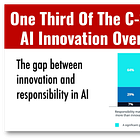This is my daily post. I write daily but send my newsletter to your email only on Sundays. Go HERE to see my past newsletters.
HAND CURATED FOR YOU
This report asks one of the most important questions of our new AI era: Is it more important to protect the public interest or the profitability and productivity of financial service providers?
This is a huge question that pits two competing camps against one another. AI proponents, who believe regulating AI will delay necessary progress, and regulators protecting public interests, who are left to pick up the broken pieces when things go wrong.
AI makes recent discussions of bias and prejudice in algorithms seem tame by comparison. Algorithms at least have known inputs and mathematical functions. AI, however, is a “black box,” detached, removed and above being asked how it makes a decision or whether it supports the goal of equal and open access to financial services.
While most AI is currently focused on customer service, which may make people ignore this problem, it’s just a matter of time before AI starts making business decisions such as credit underwriting. This is a priority use case for 45% of bankers.
Without any form of regulation, how can we be certain that AI will be built with standards of fairness?
Are we to put blind faith in AI companies run primarily by big tech billionaires or wealthy bankers, that they will do right by normal citizens as they push their vision of a more efficient and more productive AI future?
I don’t think so.
👉Recommendations to Keep Financial AI honest:
🔹 Broaden the EU AI Act
The European Commission should extend the scope of high-risk AI systems in the AI Act to cover all financial services.
🔹 Establish an AI Civil Liability Regime
The EU should establish non-contractual civil liability rules for AI and reintroduce the AI Liability Directive proposal made by the European Commission in 2022 and withdrawn in February 2025:
→ Cover non-contractual civil liability for damages caused by the output of an AI system or by the failure of an AI system to produce an output
→ Include a rebuttable ‘presumption of causality’ reversing the burden of proof and making legal redress technically possible for claimants
🔹 Evaluate the potential for supervisory enforcement
→ The European Commission and EU supervisors should assess legally and technically the possibility for financial supervisors to enforce existing EU financial regulation for AI-powered financial services.
🔹 Conduct a regulatory gap analysis
→ The European Commission should conduct a gap analysis to determine which financial regulations must be reopened to ensure that the interests of investors, consumers, citizens and society at large are protected in a world of AI-powered financial services.
And if you trust that all companies will build responsible AI, think again:






